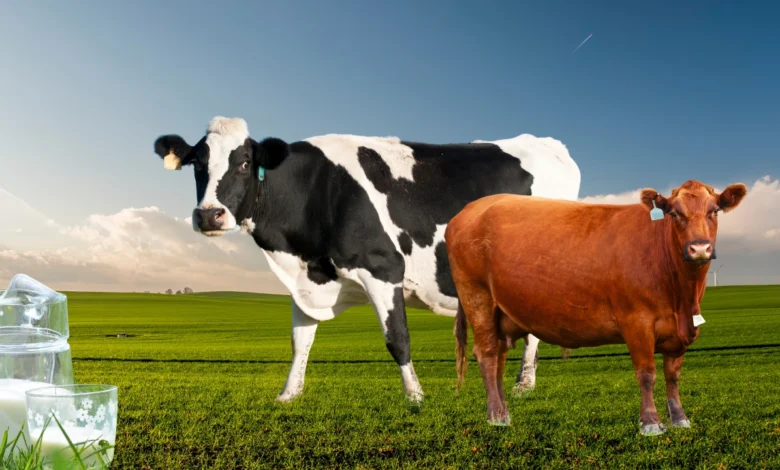
Let’s be honest: dairy cows are the unsung heroes of our farms. They work hard every single day, and they deserve more than just a clean stall and a pat on the back. If you’re raising cows for milk, then proper cow care isn’t optional—it’s essential. Just like we need morning coffee to function, cows need consistent care to produce rich, healthy milk.
This guide walks you through 5 simple daily habits that will not only boost milk production but also improve your cow’s overall wellbeing. Whether you’re a beginner or a seasoned farmer, these tips will help you form a more connected, healthier relationship with your herd.
Why Cow Care Matters More Than You Think
Here’s something I learned early on: happy cows = better milk. When I first started helping on my uncle’s small dairy farm, I thought all you had to do was feed them hay and make sure the barn wasn’t on fire. Turns out, cows are surprisingly sensitive creatures. They get stressed easily, and stress can tank milk yield faster than you can say “moo.”
Proper cow care helps in:
- Preventing diseases
- Improving milk quality and quantity
- Building trust between cow and handler
- Increasing farm profitability
And yes, a little cow pampering goes a long way (no judgment if you talk to them—they like it).
1. Clean Living = Healthy Living
Let’s start with the basics. Just like we don’t enjoy living in a dirty home, cows hate it too.
Daily cleaning of the barn and milking area is vital. Remove manure, provide fresh bedding, and ensure proper ventilation. Wet or soiled bedding increases the risk of mastitis, a common and painful infection that can reduce milk output significantly.
Pro tip: Use sawdust or straw bedding and change it daily. Not only will your cows appreciate it, but it’ll also cut down on hoof problems and udder infections.
“A clean cow is a productive cow.” — Old farmer wisdom that still holds true.
2. Feed Them Like Royalty

No, your cows don’t need a personal chef—but they do need a balanced diet every day.
Feed should include:
- High-quality roughage (hay, silage)
- Grains and concentrates (especially during lactation)
- Minerals and vitamins (talk to a vet for the right mix)
Remember, milk is made from what your cow eats, so poor-quality feed = poor-quality milk. And always ensure unlimited access to clean water. Cows can drink up to 30–50 gallons a day—basically, they’re hydrated queens.
Cow care tip: Introduce any new feed gradually to avoid bloating or digestive upset. Their stomachs are complex!
3. Grooming Is Not Just for Show
Here’s where most people underestimate the power of daily grooming in cow care. Brushing your cow:
- Stimulates blood flow
- Helps identify wounds or infections early
- Reduces stress and builds a bond
Plus, you’ll probably find it weirdly relaxing too (free therapy session, anyone?). I remember brushing our cow Rosie one evening—she literally leaned into it like a dog getting ear scratches. The next day, her milk output slightly increased. Coincidence? I think not.
Bonus: Grooming helps prevent lice and ticks, especially during warm weather.
4. Observe and Check Daily
Your cows won’t exactly say, “Hey, I’m not feeling great today,” so you’ve got to read the signs.
Take a few minutes each day to observe:
- Their gait (any limping?)
- Appetite (are they eating normally?)
- Behavior (more or less social?)
- Milk (any change in color, amount, or consistency?)
Keep a cow health journal. Trust me, tracking small changes can help you catch bigger issues before they get serious. Prevention is way cheaper—and kinder—than treatment.
Cow care bonus: Check hooves regularly for cracks or swelling. Hoof problems can make cows grumpy (and rightly so).
5. Stick to a Schedule
Cows thrive on routine. Feeding, milking, cleaning—everything should happen around the same time every day. Why? Because cows have internal clocks, and when their schedule gets messed up, it can cause:
- Lower milk production
- Stress and anxiety
- Increased chances of illness
In short, consistency equals calm cows and full milk pails.
Personal tip: I once tried milking an hour late during winter. Daisy (my sassiest cow) gave me the side-eye and produced half her usual amount. Point taken.
Cow Care = Cow Connection
At the heart of all these habits is one thing: relationship.
Cows aren’t machines—they’re living, feeling beings. The more you interact with them, the more they recognize and trust you. Call their names, pat their heads, hum while you clean the barn—these little things matter.
Over time, you’ll see their personalities bloom. Some are divas, some are chill, some just want attention 24/7. And that’s what makes this work so rewarding.
